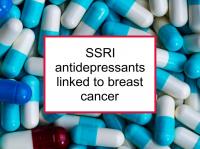Use of selective serotonin reuptake inhibitors (SSRIs) has been reported to have the potential to increase the risk of breast cancer, although not all studies have found a link. SSRIs are antidepressants that increase serotonin levels. Examples include Prozac (fluoxetine), Paxil (paroxetine), and Zoloft (sertraline).
Previous studies have examined the associations between depression or antidepressants and breast cancer risk, but not the combination of the two. This leaves open the question as to whether increased risk due to one factor might actually be attributable to the other. Now a new study that examined both factors together has reported that while depression is not associated with increased risk, use of SSRIs by women who have been diagnosed with depression is associated with a small (16%) increase in breast cancer risk.
Role of serotonin in breast cancer
Serotonin is most familiar in its role as a neurotransmitter involved with mood regulation, but it also has a role in normal mammary gland development, where it helps to regulate lactation and involution (the shrinkage of the milk-production apparatus when it is not needed). Excess serotonin is made in breast cancer cells, where it functions improperly, contributing to abnormal growth and inhibiting appropriate cell death. The net effect is that serotonin in breast cancer cells contributes to malignant growth.
SSRIs and tamoxifen
Strong SSRIs can potentially interfere with the effectiveness of tamoxifen by blocking tamoxifen's activation by cytochrome P450 2D6 (CYP2D6), which is a crucial enzyme in the metabolism of tamoxifen. It is responsible for the generation of endoxifen, which is thought to be responsible for tamoxifen's beneficial activities in breast cancer patients. This interaction appears to depend, in part, on the genetic makeup of the woman taking both drugs. Just as the effect of tamoxifen treatment varies widely among individuals, so too does the interaction between tamoxifen and SSRIs. Until vulnerable patients can reliably be identified, it makes sense for those taking tamoxifen to avoid Prozac, Paxil, Zoloft and similar SSRIs.
Latest research links SSRI use to increase breast cancer risk
The prospective study referenced at the beginning of this news story was designed to investigate whether depression combined with antidepressant use increases the risk of breast cancer. To conduct the study, the authors used data from 77,482 women enrolled in the Nurses' Health Study. Data concerning depression and antidepressant use were collected from 2000 onwards. Women self-reported ever having been diagnosed with clinical depression (8.9% of the total) and their use of specific types of antidepressants (8.7%). Not all women who take antidepressants are depressed, since these drugs are also prescribed for other conditions such as anxiety and hot flashes. A total of 2,567 of the women were diagnosed with invasive breast cancer through 2012. Results were adjusted for age, body mass index (BMI), and menopausal status.
The authors found no significant associations between clinical depression or antidepressant use and breast cancer risk overall. When considering only women who reported both clinical depression and antidepressant use, depression remained unassociated with risk of breast cancer. However, antidepressant use evinced a small, borderline significant increase in risk. This association held for selective serotonin reuptake inhibitors (16% increase in risk) but not for other classes of antidepressants. The authors conclude that depression is not associated with breast cancer risk, while a slight increase in risk associated with SSRI use could not be excluded. The authors plan further analyses that will update depression and antidepressant use over a longer follow-up period and evaluate the influence of menopausal status and hormone receptor (ER/PR) subtype.
